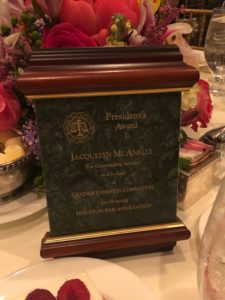CRG News - Blog
Cersonsky, Rosen & Garcia, P.C. is now Cersonsky, McAnelly & Garcia, P.C.
Cersonsky, Rosen & Garcia, P.C. is now Cersonsky, McAnelly & Garcia, P.C.

Jacquelyn D. McAnelly has joined the partnership team at Cersonsky, Rosen & Garcia, P.C. as Managing Shareholder. Jacquelyn D. McAnelly began working with Cersonsky, Rosen & Garcia, P.C. in 2010. CM, PC thanks Rachel R. Rosen for her leadership and wishes her well in her retirement.
Jacquelyn McAnelly Receives the HBA’s Presidential Award
Jacquelyn D. McAnelly is the recipient of the Houston Bar Association’s President’s Award for Outstanding Service as Co-Chair of the Gender Fairness Committee for 2018-2019.
 The Gender Fairness Committee examines issues related to gender fairness in the legal profession and develops programs that provide a forum for the discussion of issues related to gender fairness, including seminars and networking opportunities. The committee promotes awareness of these issues within the profession and encourages law firms and corporate legal departments to sign the “Gender Initiative Commitment Statement.”
The Gender Fairness Committee examines issues related to gender fairness in the legal profession and develops programs that provide a forum for the discussion of issues related to gender fairness, including seminars and networking opportunities. The committee promotes awareness of these issues within the profession and encourages law firms and corporate legal departments to sign the “Gender Initiative Commitment Statement.”
The Committee presented 5 events for the 2018-2019 Bar year. In November 2018, the committee presented a panel speaking on “Men as Mentors: the Importance of Sponsorship.” In March, the Committee co- sponsored “An Afternoon with Harris County District Attorney Kim Ogg.” In April 2019, the Committee hosted Linda Addison who discussed her “12 Principles for Life and Law Practice.” On May 2, 2019, the Gender Fairness Committee hosted its last event, a judicial panel with Justice Eva Guzman, Judge Lee Rosenthal, Judge Belinda Hill and Judge Sylvia Matthews on “Balancing the Scales: A Discussion about Gender Parity on the Bench.” Jacquelyn received the award at the Houston Bar Association’s Annual Dinner on May 16, 2019.
Fraudulent Transfers Series: When Fraudulently Transferred Funds End Up in a “Homestead”
Oftentimes, fraudulently transferred funds end up being invested in the debtor or subsequent transferee’s personal residence under the mistaken belief that creditors cannot reach it if it is the transferee’s homestead. However, it is well-settled law that the homestead and exemption laws of Texas were never intended to be, and cannot be, the haven of wrongfully obtained money or properties. [1]Pace v. McEwen, 617 S.W.2d 816, 818 (Tex. App.—Houston [14th Dist.] 1981, no writ); Baucum v. Texan Oil Corporation, 423 S.W.2d 434, 442 (Tex. Civ. App.—El Paso 1967, writ ref’d n.r.e.)
Therefore, “funds wrongfully diverted from a corporation and subsequently diverted into property ordinarily exempt will be subject to a constructive trust.” [2]Baucum v. Texan Oil Corporation, 423 S.W.2d at 442. A constructive trust is “an equitable tool in the court’s power that can infer a fiduciary-like relationship within a transaction for the purpose of promoting justice.” [3]Harris v. Sentry Title Co., Inc., 715 F.2d 941, 946 (5th Cir.1983); see also Mowbray v. Avery, 76 S.W.3d 663, 681 (Tex. App.—Corpus Christi 2002). The constructive trust will be for the benefit of the defendant’s creditors. Because the property was purchased with fraudulently transferred funds, it is not owned by the homestead claimant, rather it is owned by the trust. So, the homestead claimant cannot actually show ownership to prove up the homestead.
To attack a claim of homestead, a creditor should file a lawsuit that alleges violations of the Texas Uniform Fraudulent Transfer Act (“TUFTA”) with regard to the homestead and request that a constructive trust be imposed. The creditor should also seek a preliminary injunction that would enjoin the debtor/subsequent transferee from further transferring the asset.
Furthermore, when a creditor has properly asserted that a debtor fraudulently transferred funds into a property designated as a homestead, a notice of lis pendens can be filed (as the creditor has asserted an interest in the alleged homestead property). [4]See Texas Kidney, Inc. v. ASD Specialty Healthcare, 2014 WL 3002425, at 9 (Tex. App.—Houston [14th Dist.] July 1, 2014, no pet.). This will notice to all potential subsequent transferees, that conduct a title search, that the property is subject of a lawsuit.
If the jury finds that fraudulently transferred funds were used to purchase property designated as a homestead, the court can place the property in a constructive trust for the creditors and the creditors can sell it to satisfy their judgment.
References
| ↑1 | Pace v. McEwen, 617 S.W.2d 816, 818 (Tex. App.—Houston [14th Dist.] 1981, no writ); Baucum v. Texan Oil Corporation, 423 S.W.2d 434, 442 (Tex. Civ. App.—El Paso 1967, writ ref’d n.r.e.) |
|---|---|
| ↑2 | Baucum v. Texan Oil Corporation, 423 S.W.2d at 442. |
| ↑3 | Harris v. Sentry Title Co., Inc., 715 F.2d 941, 946 (5th Cir.1983); see also Mowbray v. Avery, 76 S.W.3d 663, 681 (Tex. App.—Corpus Christi 2002). |
| ↑4 | See Texas Kidney, Inc. v. ASD Specialty Healthcare, 2014 WL 3002425, at 9 (Tex. App.—Houston [14th Dist.] July 1, 2014, no pet.). |
Fraudulent Transfers Series: Obtaining an Injunction To Stop Further Transfers During Litigation
The Texas Uniform Fraudulent Transfer Act allows injunctive relief to proceed against transferees in order to block the transferee from making further transfers of the assets. [1]Tanguy v. Laux, 259 S.W.3d 851, 859 (Tex. App. – Houston [1st Dist.] 2008, no pet.) . In particular, TUFTA states that . . . subject to applicable principles of equity and in accordance with applicable rules of civil procedure, TUFTA allows for the following remedies:
(A) an injunction against further disposition by the debtor or a transferee or both of the asset transferred or of other property;
(B) appointment of a receiver to take charge of the asset transferred or of other property of the transferee; or
(C) any other relief the circumstances may require. [2] See §24.008(a)(3)(A)-(C)
In Tanguy v. Laux, the First Court of Appeals made clear that one seeking an injunction did not have to have a lien on the real property against which the injunction was sought under TUFTA. [3]Id at 859. The Court’s holding shows that a creditor is not required to have lien on property, in order to pursue a claim against the property for having been fraudulently transferred pursuant to TUFTA. [4] See also Texas Kidney, Inc. v. ASD Specialty Healthcare, No. 14-13-00106-CV, 2014 WL3002425 (Tex. App – Houston [14th Dist.] July 1, 2014, no pet.) (“Texas Kidney”) .
In Texas Kidney the Plaintiff was ASD Specialty Healthcare, (“ASD”) which sold medications to Texas Kidney, Inc. or “TKI”, a dialysis center. TKI failed to pay for $405,909.73 in medications sold to TKI. As a result, ASD sued TKI for the debt. [5] Id. at 1-2.
TKI sold the dialysis center for $3 million, but still did not pay ASD. When ASD’s counsel (Cersonsky, Rosen & Garcia lawyers M.H. Cersonsky and Marianne G. Robak) learned of the sale and obtained evidence of the transferees who received TKI’s sales proceeds, the petition was amended to include the transferees of TKI who recieved over $1.3 million, e.g. (a) Ahmed Rabie and Sana Rabie approximately $800,000.000 used to buy a home which they declared to be their homestead; and (b) Ahmed and Sana Rabie $500,000.000 used to purchase a certificate of deposit. [6] Id. at 5-6.
After a two-day evidentiary hearing, the trial court issued an injunction against the transferees, Ahmed Rabie and Sana Rabie, enjoining them from selling, encumbering, or disposing of any interest in the real property in question and from withdrawing funds or otherwise disbursing the balance left in the certificate of deposit. [7] Id. at 2. TKI and the Rabies appealed. However, the Court of Appeals affirmed the trial court’s injunction against the transferees because the evidence showed that fraudulently transferred funds were used to purchase the alleged homestead. [8]Id. at 5-6. This clearly shows TUFTA reaches transferees and the assets transferred to them.
Obtaining an injunction is a powerful tool provided to creditors by way of TUFTA that is often not used in litigation. However, when an injunction is obtained in a TUFTA case, it can lead to a favorable outcome in collecting a debt.
References
| ↑1 | Tanguy v. Laux, 259 S.W.3d 851, 859 (Tex. App. – Houston [1st Dist.] 2008, no pet.) |
|---|---|
| ↑2 | See §24.008(a)(3)(A)-(C) |
| ↑3 | Id at 859. |
| ↑4 | See also Texas Kidney, Inc. v. ASD Specialty Healthcare, No. 14-13-00106-CV, 2014 WL3002425 (Tex. App – Houston [14th Dist.] July 1, 2014, no pet.) (“Texas Kidney”) |
| ↑5 | Id. at 1-2. |
| ↑6 | Id. at 5-6. |
| ↑7 | Id. at 2. |
| ↑8 | Id. at 5-6. |
Fraudulent Transfers Series: Who Is A “Creditor” Under the Fraudulent Transfer Act?
The Texas Uniform Fraudulent Transfer Act (“TUFTA”) provides that a transfer of an asset is fraudulent, as to a creditor, if the debtor made the transfer with the actual intent to hinder, delay or defraud any of the debtor’s creditors.
The definitions portions of TUFTA defines “creditor” as a person. . .who has a claim.” Tex. [1]Bus. & Com. Code. § 24.002(4) . “Claim” is defined as a right to payment or property, whether or not the right is reduced to judgment, liquidated, unliquidated, fixed, contingent, matured, unmatured, disputed, undisputed, legal, equitable, secured, or unsecured. [2]See Tex. Bus. & Com. Code. § 24.002(3)(emphasis added) .
Texas courts have given a broad construction to the term creditor, so that TUFTA “protects the holders of unliquidated unmatured contingent claims.” [3]Zahra Spiritual Trust v. United States, 910 F.2d 240, 248 (5th Cir.1990) . Therefore, creditors are “persons having subsisting obligations against the debtor at the time the fraudulent alienation was made or the secret trust created, although their claims may not have matured or even been reduced to judgment until after such conveyance.” [4]Burnett at 743; see also First State Bank of Mobeetie v. Goodner, 168 S.W.2d 941 (Tex.Civ.App.—Amarillo 1943, no writ) .
To summarize, a plaintiff does not need to first prove that a debt is owed or obtain a judgment before it can be considered a “creditor” entitled to relief by way of the TUFTA.
The next blog will answer the question: How does one obtain an injunction to stop further transfers from taking place during litigation?
References
| ↑1 | Bus. & Com. Code. § 24.002(4) |
|---|---|
| ↑2 | See Tex. Bus. & Com. Code. § 24.002(3)(emphasis added) |
| ↑3 | Zahra Spiritual Trust v. United States, 910 F.2d 240, 248 (5th Cir.1990) |
| ↑4 | Burnett at 743; see also First State Bank of Mobeetie v. Goodner, 168 S.W.2d 941 (Tex.Civ.App.—Amarillo 1943, no writ) |
